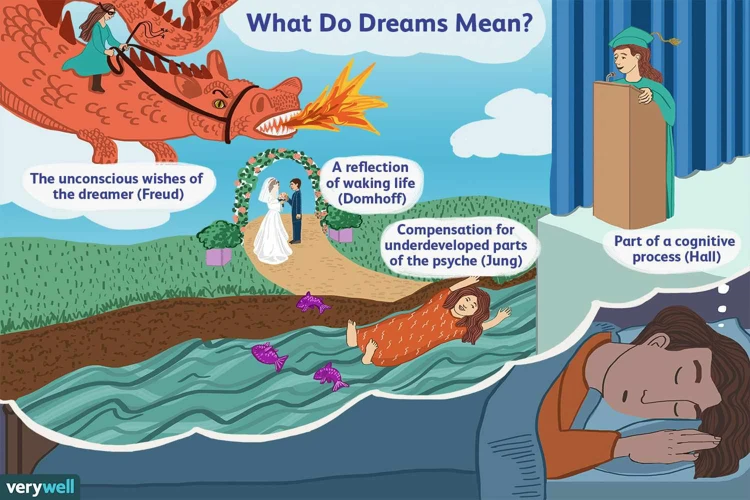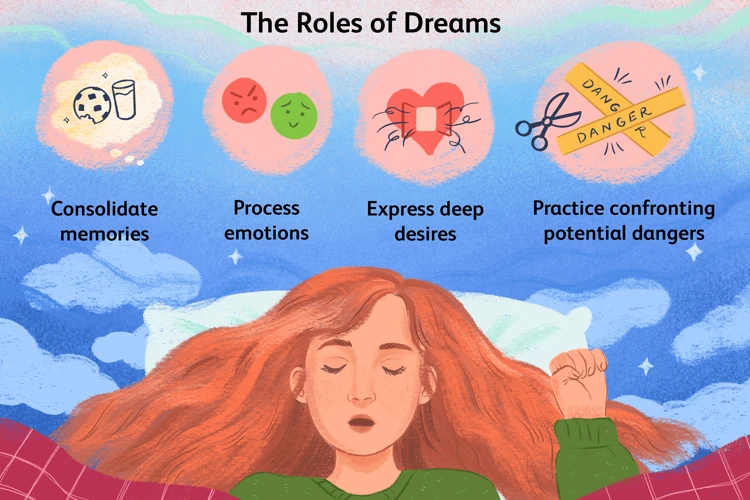Many people have experienced the strange sensation of seeing themselves in a dream. It can be a perplexing and intriguing experience that leaves us questioning its meaning. The Meaning of Seeing Yourself in a Dream: Explained delves into the various interpretations and psychological perspectives surrounding this phenomenon. From self-reflection to unresolved issues and empowerment, this article aims to unravel the symbolism behind seeing oneself in dreams. Additionally, we explore the significance of actions, environments, and emotions within the dream, providing tools for interpreting and understanding these powerful nocturnal encounters. Whether you’re curious about your subconscious or seeking guidance for interpreting your dreams, this article offers insights and suggestions for unlocking the meaning behind seeing yourself in a dream.
Common Interpretations

When it comes to the common interpretations of seeing yourself in a dream, there are a few key perspectives that can shed light on this intriguing phenomenon. One possible interpretation is that seeing yourself in a dream is a symbol of self-reflection. It can represent a subconscious quest for self-awareness and introspection. Another interpretation is that it may signify unresolved self-issues. Seeing yourself in a dream could be a manifestation of unresolved emotions, conflicts, or desires that you may need to address in your waking life. Lastly, this dream experience can also be seen as an indication of self-acknowledgment and empowerment. It may reflect a growing sense of self-confidence and empowerment, indicating that you are recognizing and embracing your own strengths and capabilities. These common interpretations provide different lenses through which we can understand the meaning behind seeing ourselves in dreams.
1. Symbol of Self-Reflection
Seeing yourself in a dream can often be interpreted as a symbol of self-reflection. It signifies a subconscious desire for introspection and self-awareness. In this dream, you may encounter an image or representation of yourself that prompts you to reflect on your own thoughts, emotions, and actions. It acts as a metaphorical mirror, urging you to delve deeper into understanding your true self. This dream can serve as a reminder to take the time to evaluate your own beliefs, values, and goals. It may signify a need for self-examination and a desire for personal growth and development. By reflecting on the symbolism of self-reflection in your dream, you open the door to greater self-awareness and a deeper understanding of yourself.
2. Unresolved Self-Issues
Seeing yourself in a dream can sometimes be a reflection of unresolved self-issues. It may suggest that there are certain emotions, conflicts, or desires that you have not fully addressed or resolved in your waking life. This could be related to unresolved trauma, past experiences, or even repressed emotions that are lurking beneath the surface. By appearing in your dream, your subconscious mind is urging you to confront these unresolved self-issues and find ways to resolve them. It is essential to pay attention to the specific details and emotions in the dream, as they can offer valuable insights into the nature of these unresolved self-issues. Through introspection and self-reflection, you can begin the process of healing and personal growth.
3. Self-Acknowledgment and Empowerment
– Seeing yourself in a dream can also be seen as a symbol of self-acknowledgment and empowerment.
– It may suggest that you are recognizing and embracing your own strengths, capabilities, and potential.
– This dream experience can serve as a reminder to have confidence in yourself and your abilities.
– It signifies a growing sense of self-assurance and belief in one’s own worth.
– By seeing yourself in a dream in a positive and empowered light, you are encouraged to take charge of your life and pursue your goals with conviction and determination.
– Embrace this dream as a reminder that you have the power to create the life you desire and to be the best version of yourself.
Psychological Perspective

From a psychological perspective, seeing yourself in a dream holds significant meaning. One potential explanation is that it represents identity exploration. Dreams serve as a space for the subconscious mind to explore and experiment with different aspects of one’s identity and self-concept. Seeing oneself in a dream can therefore indicate a desire for self-discovery and a deeper understanding of who we are. Another psychological perspective suggests that seeing oneself in a dream signifies subconscious self-awareness. This means that our dreams can tap into our deeper thoughts, emotions, and desires that may be hidden from our conscious awareness. Lastly, the psychological interpretation of seeing oneself in a dream highlights the integration of the self. It can signify the merging of different aspects of our personality or the alignment of our thoughts, feelings, and actions. Through these psychological perspectives, we can gain further insight into the significance of seeing ourselves in dreams.
1. Identity Exploration
Identity exploration is a key psychological perspective when it comes to understanding the meaning of seeing yourself in a dream. This interpretation suggests that the dream serves as a platform for exploring and understanding various aspects of your identity. It allows you to delve into your values, beliefs, and personal traits, offering a deeper self-awareness. Seeing yourself in a dream can be an invitation to question and reflect on who you are, your aspirations, and the different roles you play in your waking life. It presents an opportunity for introspection and personal growth, guiding you towards a better understanding of your true self.
2. Subconscious Self-Awareness
Subconscious self-awareness is a significant aspect when considering the meaning of seeing yourself in a dream. It suggests that the dream may serve as a reflection of your subconscious mind’s awareness and understanding of yourself. In these dreams, you might encounter symbols, images, or situations that represent hidden aspects of your personality, desires, or fears. This self-awareness from your subconscious can provide valuable insights into your inner thoughts and emotions that may be influencing your waking life. Paying attention to the details of the dream and reflecting on its messages can contribute to a deeper understanding of oneself and aid in personal growth and self-discovery.
3. Integration of the Self
The concept of the integration of the self refers to the harmonious blending of different aspects of one’s personality or identity. In the context of seeing yourself in a dream, it suggests that this experience may symbolize the process of integrating various parts of yourself that may have been previously fragmented or disconnected. This could involve reconciling conflicting emotions, accepting and embracing different aspects of your personality, or finding balance between different roles or responsibilities in your life. The dream may serve as a reminder that true fulfillment and growth come from embracing and integrating all aspects of yourself, rather than denying or suppressing certain parts. It signifies a journey towards wholeness and self-acceptance.
Symbolism of Actions and Environment

In addition to the common interpretations, the symbolism of actions and environment within the dream can offer further insight into the meaning of seeing yourself. The actions or behaviors you engage in during the dream can hold significant symbolism. For example, if you see yourself accomplishing a difficult task or overcoming a challenge, it may represent your ability to face and conquer obstacles in your waking life. Similarly, the location and setting of the dream can carry symbolic meaning. It may reflect your current emotional state or subconscious desires. If you find yourself in a familiar place, it could suggest a need to revisit or confront unresolved issues from your past. The emotions and interactions experienced during the dream can provide clues about your relationships and emotional well-being. Paying attention to these elements can offer valuable insights into the overall interpretation of seeing yourself in a dream.
1. Activities or Behaviors
The activities or behaviors that you engage in within the dream can offer valuable insights into the meaning of seeing yourself. Pay attention to the actions you are taking or the behaviors you exhibit. Are you exploring new territories or facing challenges head-on? This could symbolize a sense of adventure and growth in your waking life. Alternatively, if you find yourself engaging in negative or harmful activities, it could indicate unresolved issues or self-destructive patterns that need to be addressed. Examining the activities or behaviors portrayed in your dream can provide a deeper understanding of how you perceive yourself and your actions in your waking life.
2. Location and Setting
When it comes to the symbolism of location and setting in dreams where you see yourself, there are several key aspects to consider.
– The location of the dream can represent different facets of your life. For example, seeing yourself in a familiar place may indicate a focus on your personal life or relationships, while being in an unfamiliar or surreal location could suggest exploration and new experiences.
– The setting can also reflect your emotional state. A serene and peaceful setting may signify contentment or emotional stability, while a chaotic or tense environment may indicate stress or unresolved issues.
– Additionally, the specific details of the location and setting, such as whether it is indoors or outdoors, the time of day, or the weather conditions, can provide further insight into the meaning of the dream. It is important to reflect on these aspects when interpreting the symbolism of the dream and how it relates to your experience of seeing yourself.
3. Emotions and Interactions
Emotions and interactions within a dream can offer valuable insights into the meaning of seeing yourself in that dream. Pay attention to the emotions you experience during the dream. Are you feeling joy, fear, sadness, or anger? These emotions can provide clues about your subconscious thoughts and feelings. Additionally, observe how you interact with others in the dream. Are you engaging in positive or negative interactions? Are you taking a leadership role or being submissive? These interactions can reflect your waking life relationships and dynamics. Analyzing the emotions and interactions within the dream can help you decipher the underlying messages and symbolism related to seeing yourself in that dream.
Interpreting the Dream
Interpreting the dream of seeing yourself requires a thoughtful analysis of both the dream itself and your waking life. Reflecting on Your Waking Life is an essential step in understanding the dream’s meaning. Consider any significant events, emotions, or relationships that may be connected to the dream experience. Considering Personal Associations is also crucial in unraveling the symbolism. Reflect on your personal feelings and associations with various elements of the dream, such as specific actions, people, or objects. This introspection can offer insights into the subconscious meanings behind the dream. However, if you find yourself struggling to interpret the dream’s significance, it may be beneficial to seek professional guidance. Consulting with a dream analyst, therapist, or psychologist can provide valuable insights and help you explore the deeper layers of your subconscious mind. By taking these steps, you can gain a deeper understanding of the dream’s message and how it relates to your waking life.
1. Reflect on Your Waking Life
Reflecting on your waking life is a crucial step in interpreting the meaning behind seeing yourself in a dream. Take a moment to contemplate your current circumstances, emotions, and relationships. Are there any significant events or experiences that could be influencing your dreams? Consider your thoughts and feelings towards yourself and others. Reflect on any unresolved issues or conflicts in your waking life that may be surfacing in your dreams. Pay attention to any patterns or recurring themes that you notice. Examining your waking life can provide valuable insights into the symbolism and messages contained within your dreams.
2. Consider Personal Associations
Consider personal associations when interpreting the meaning of seeing yourself in a dream. Our individual experiences, memories, and emotions often shape our perception and understanding of symbols within dreams. Reflect on any personal associations that come to mind when you think about seeing yourself in the dream. Consider how these associations relate to your current circumstances or any unresolved issues in your waking life. These personal connections can provide valuable insights and clues for interpreting the deeper meaning behind the dream. Pay attention to any recurring themes or symbols that may appear in your dreams as they can also provide valuable information about your subconscious thoughts and feelings.
3. Seek Professional Guidance
If you find yourself struggling to interpret the meaning of seeing yourself in a dream, seeking professional guidance can be beneficial. A therapist or dream analyst with expertise in dream interpretation can provide valuable insights and help you explore the symbols and emotions within your dream. They can offer a fresh perspective and guide you through the process of unraveling the deeper meanings behind your dream experiences. Professional guidance can bring clarity and understanding, ensuring that you make the most of your dream insights and use them as a tool for personal growth and self-discovery.
Conclusion
In conclusion, the experience of seeing yourself in a dream carries various meanings and interpretations. From a psychological perspective, it can be a tool for identity exploration, subconscious self-awareness, and the integration of the self. Symbolism in actions, environments, and emotions within the dream further adds depth to its interpretation. Reflecting on your waking life, considering personal associations, and seeking professional guidance are valuable approaches to interpreting the meaning behind this dream phenomenon. Whether it signifies self-reflection, unresolved self-issues, or self-acknowledgment, each interpretation holds significance in understanding ourselves on a deeper level. Embrace the mysteries of your dreams and utilize them as pathways to self-discovery and personal growth.
Frequently Asked Questions
1. Can seeing yourself in a dream predict the future?
While dreams can provide insights into our thoughts and emotions, they are not a reliable source for predicting the future. Dreams are often influenced by our subconscious mind and can reflect our current experiences, emotions, and aspirations.
2. Why do some people never see themselves in dreams?
Dream experiences can vary from person to person. Not seeing oneself in a dream could be due to different factors, such as the individual’s sleep patterns, dream recall ability, or the nature of their dreams. It is not uncommon for dreams to focus on other people or external situations rather than self-representation.
3. Is there a universal meaning behind seeing yourself in a dream?
Dream interpretation is subjective and can vary depending on individual experiences and beliefs. While some interpretations may have common themes, it is important to consider personal associations and context when interpreting the meaning of seeing oneself in a dream.
4. How can seeing myself in a dream help with personal growth?
Seeing oneself in a dream can be an opportunity for self-reflection, introspection, and personal growth. It can provide insights into unresolved emotions or conflicts, allowing individuals to address and work through these issues in their waking life.
5. Can lucid dreaming enhance the experience of seeing oneself in a dream?
Lucid dreaming, where individuals are aware that they are dreaming, can indeed enhance the experience of seeing oneself in a dream. It offers the opportunity for conscious exploration and control within the dream, allowing individuals to gain further insights and potentially influence the dream’s meaning.
6. What if I feel scared or threatened when I see myself in a dream?
Feeling scared or threatened when seeing yourself in a dream can be indicative of deeper fears or insecurities within your subconscious. It may be helpful to delve into these emotions and explore their origins, either through self-reflection or with the guidance of a therapist or dream analyst.
7. Are repetitive dreams of seeing oneself significant?
Repetitive dreams of seeing oneself can indicate that certain issues or emotions are persistently present in your life. These dreams may serve as a reminder to address and resolve these recurring themes or to pay closer attention to certain aspects of your self-identity.
8. Can seeing oneself in a dream have different meanings for different people?
Yes, seeing oneself in a dream can have different meanings for different people. Dreams are deeply personal experiences and can be influenced by an individual’s unique background, culture, and personal associations. It is crucial to consider personal context when interpreting the meaning of these dreams.
9. Are there any negative interpretations of seeing oneself in a dream?
While dream interpretations can vary, there are no inherently negative interpretations of seeing oneself in a dream. Even dreams that evoke uncomfortable emotions or challenging situations can serve as opportunities for growth, self-discovery, and resolving unresolved issues.
10. Can dream journaling help in understanding the meaning of seeing oneself in a dream?
Yes, keeping a dream journal can be a helpful tool in understanding the meaning behind seeing oneself in a dream. Recording dreams immediately after waking can aid in remembering details, patterns, and emotions associated with the dream, providing valuable insight for interpretation and reflection.


